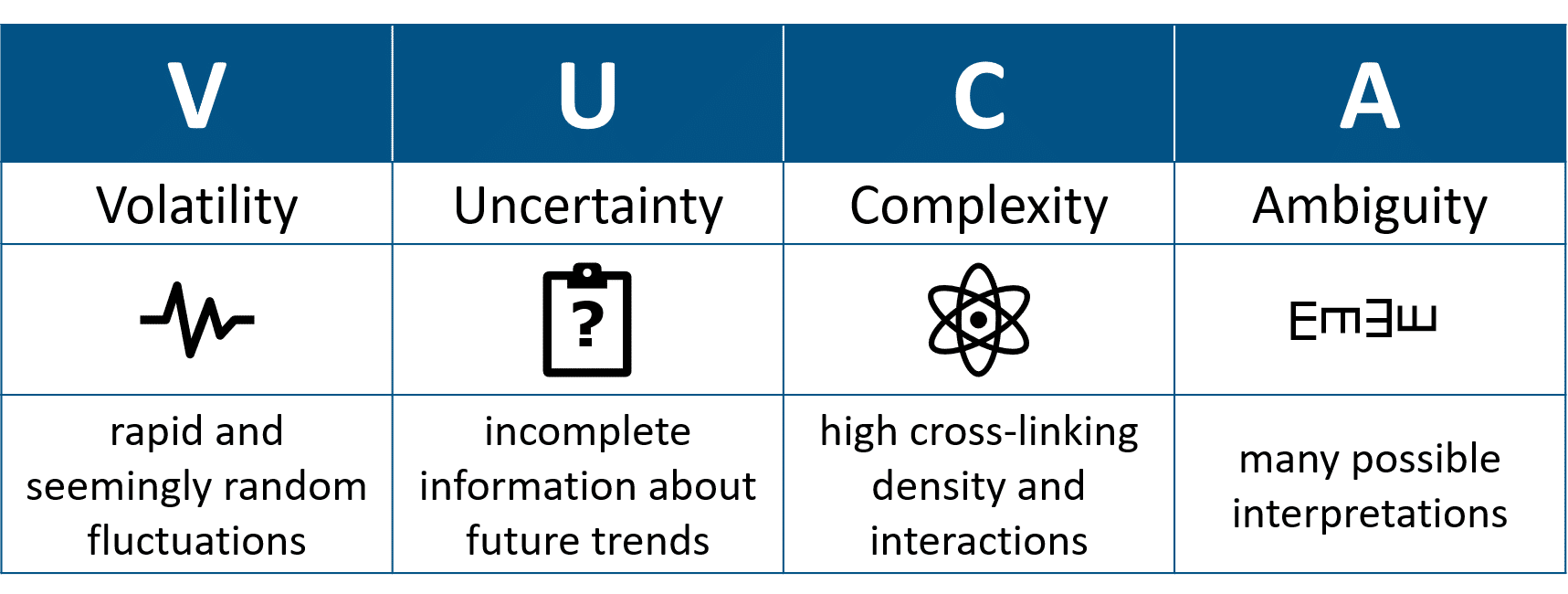VUCA
Increasingly Unstable Environment
VUCA is an acronym that stands for Volatility, Uncertainty, Complexity, and Ambiguity. It is used to describe the unpredictable and challenging nature of the modern business environment. The term originated from the U.S. military to describe the conditions faced in the post-Cold War era, but it has since been adopted by business leaders and strategists to capture the complexity and rapid changes in various industries and markets.
In a VUCA world, organizations must navigate through unpredictable events, deal with high levels of uncertainty, navigate complex challenges, and make decisions in ambiguous situations.

Therefore, navigating becomes more and more challenging. The key to powerful navigation lies in the harmonious interplay of strategic foresight and an ecosystem of trust: Thus, organizations create a beneficial environment for sustainable growth, long-term success, and positive societal impact.
Strategic Foresight
Strategic foresight involves systematically exploring and analyzing possible future scenarios to identify emerging trends, risks, and opportunities that may impact an organization's long-term success. It is a proactive approach to understanding and preparing for the future.
Why organizations need strategic foresight in a VUCA world:
Anticipating Change
Strategic foresight helps organizations to anticipate and understand potential changes in their operating environment. By identifying emerging trends and disruptive forces, organizations can proactively adapt their strategies, products, and services to meet the needs of tomorrow.
Mitigating Risks
Strategic foresight enables organizations to identify and assess potential risks and challenges that may arise in the future. By anticipating these risks, organizations can develop contingency plans and implement risk mitigation strategies to minimize their negative impacts.
Exploiting Opportunities
Strategic foresight helps organizations identify emerging opportunities that may arise from shifts in technology, market dynamics, or societal trends. By understanding these opportunities early on, organizations can position themselves to capitalize on them and gain a competitive advantage.
Long-term Planning
Strategic foresight provides organizations with a long-term perspective, helping them develop robust and adaptable strategic scenarios. It allows organizations to think beyond short-term goals and consider the potential consequences and implications of their decisions in the long run.
Innovation & Adaptability
Strategic foresight encourages organizations to foster a culture of innovation and adaptability. By systematically scanning the horizon for emerging trends and disruptive technologies, organizations can identify new possibilities and adjust their strategies and business models accordingly.
Enhancing Decision-making
Strategic foresight provides decision-makers with a broader understanding of the future landscape. It helps them make more informed decisions by considering multiple scenarios, potential outcomes, and alternative strategies.
Ecosystem of Trust
An ecosystem of trust is an organizational environment in which the staff and other stakeholders collaborate with a high level of trust. It involves establishing and maintaining a foundation of trust among all participants, which particularly enhances the psychological safety – a trusting and empathetic atmosphere in which employees dare to address mistakes and learn together.
Why organizations need an ecosystem of trust in a VUCA world:
Collaboration & Cooperation
Trust is essential for successful collaboration and cooperation. When there is trust among participants, they are more willing to share resources, knowledge, and expertise, leading to mutually beneficial outcomes and increased innovation.
Stakeholder Relationships
Trust is crucial for building strong and positive relationships with stakeholders, including customers, suppliers, employees, investors, and the community. Trust fosters loyalty, credibility, and reputation, which are vital for long-term sustainability and growth.
Information Sharing
Trust encourages the free flow of information and knowledge exchange among participants. When organizations trust that their data and intellectual property will be protected, they are more likely to share insights, best practices, and lessons learned, leading to collective learning and improvement.
Adaptability & Innovation
Trust enables organizations to take risks and experiment with new ideas. In an ecosystem of trust, individuals feel safe to express their opinions, challenge existing norms, and contribute to innovation and change. This fosters an environment of continuous improvement and adaptability.
Reputation & Brand Value
Trust is closely linked to an organization's reputation and brand value. Organizations that operate within an ecosystem of trust are more likely to be seen as reliable, ethical, and responsible. This enhances their brand image, attracts customers and talent, and gives them a competitive edge.
Resilience & Crisis Management
In times of crisis or uncertainty, an ecosystem of trust provides a foundation for resilience. Trust enables organizations to collaborate, coordinate efforts, and make collective decisions, leading to effective crisis management and recovery.
